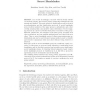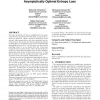61 search results - page 10 / 13 » Security Properties of Two Authenticated Conference Key Agre... |
CSFW
1999
IEEE
13 years 12 months ago
1999
IEEE
Strand space analysis [13, 12] is a method for stating and proving correctness properties for cryptographic protocols. In this paper we apply the same method to the related proble...
ACNS
2006
Springer
14 years 1 months ago
2006
Springer
In a society increasingly concerned with the steady assault on electronic privacy, the need for privacy-preserving techniques is both natural and justified. This need extends to t...
ISW
2001
Springer
14 years 2 days ago
2001
Springer
We present the adaptation of our model for the validation of key distribution and authentication protocols to address specific needs of protocols for electronic commerce. The two ...
CRYPTO
2009
Springer
14 years 2 months ago
2009
Springer
We study the design of cryptographic primitives resilient to key-leakage attacks, where an attacker can repeatedly and adaptively learn information about the secret key, subject o...
STOC
2010
ACM
13 years 11 months ago
2010
ACM
We study the problem of "privacy amplification": key agreement between two parties who both know a weak secret w, such as a password. (Such a setting is ubiquitous on th...


